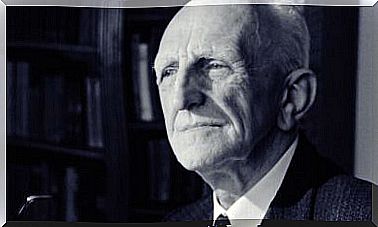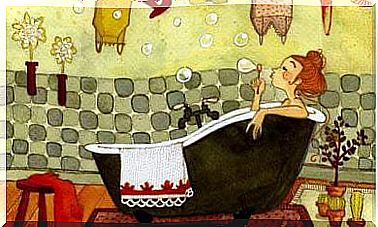The Vision Of Yourself When You Leave Your Mind

A phrase that is in the repertoire of many reads: “all I want is to be happy. ” Thus, you work so hard to achieve the desired happiness that it can affect your vision of yourself and lead you to a spiral of discomfort.
At a time when humanity has reached a remarkable degree of development, we find that a high percentage of the world’s population suffers. The WHO statistics on mental health are alarming, and consultations with professionals about how to maintain or regain well-being are increasing.
Psychologists accompany those who have this goal and we observe a general tendency to avoid any type of pain. But, just as you condemn the flight of a butterfly if you pin its wings to a cork, happiness can be captured by many elements. Among them, the obsessive pursuit of happiness can distort your vision of yourself.

The trap of happiness that conditions the vision of yourself
According to the relational framework theory, on which acceptance and commitment therapy is based, the way you try to cope with difficulties can lead you to a dead end. This theory is based on a research program on the functioning of the human mind (Hayes, Barnes-Holmes and Roch, 2001) that suggests that many of the strategies that people use to solve our problems are actually traps that increase our suffering. .
How do you participate in the construction of this psychological trap ? Your mind ends up becoming your worst enemy, it is a wonderful environment control tool that involves you in a tricky game.
Myths about happiness
A series of myths have been created around the concept of happiness that contribute to the creation of the trap in which your mind is sometimes involved. This is one of the obstacles that prevent your mind from discriminating what actions are those that lead you to a life with meaning. These myths lead you to a fight against your own nature, making it difficult to separate from it, as they are also deeply rooted in our culture.
Russ Harris, an expert physician and psychotherapist in ACT (Acceptance and Commitment Therapy), talks about four fundamental myths that constitute the basic blueprint of this psychological trap of which we speak:
- The happiness is the natural state of every human being. As in the end of the stories, happiness will end up reigning in your life and in everyone’s: “and they lived happily and ate partridges.”
- If you are not happy, it is because you have a defect. Therefore, when you experience painful feelings and thoughts, you criticize yourself because you consider yourself weak.
- To build a better life, you have to get rid of negative thoughts. This welfare society of which we are a part is obsessed with finding happiness and that fuels the idea that we only have to experience positive emotional states. However, keep in mind that generally, the things that we give importance to carry different feelings, both pleasant and unpleasant.
- You should be able to control what you think and feel. If you are like most other human beings on the planet, surely you have invested a lot of time and energy in controlling your inner world. On the other hand, you will also have realized that, unless your activation levels are not very high, you can kill them to a certain extent. This myth leads to a lot of frustration when you are not able to control the inner experiences associated with difficult moments in your life.
The illusion of control
Let us remember the great advantage that our mind has given us as a species. It has allowed us to shape the world and adapt it to our needs and wants. Not surprisingly, this astonishing ability to control the environment makes you have high expectations of control on other planes as well.
In the material world, you will find that the control strategies you employ usually work well. For example, if there is a saber-toothed tiger stalking you, get to safety in one away from it.
However, when it comes to our inner world, such as getting rid of a negative thought, or a painful memory, our skill is very different with respect to the realm of the tangible.
Cognitive fusion
Thoughts, mental images, memories, desires, physical sensations and emotions, make up your inner world, and are usually the ones that have the greatest influence on your behavior.
Through these elements you adopt a perspective before the world and build the vision of yourself, they are the glasses through which you see reality, which is ultimately nothing more than your own reality.
We are talking about a cognitive fusion between these and what happens to you. That is, all these internal products of your mind and what they refer to, are mixed.
You thus enter a spiral that makes you live your internal experiences as if they were real, important and possible threats.
Thus, we can react to the words of a thriller as if someone were about to be murdered, or to the statement “I am going to fail” as if failure were an inevitable result.

The vision of yourself when you leave your mind
The vision of yourself conditions your choices. Your inner world conditions your way of acting, feeling, thinking.
In this sense, the truth is that we have less control than we would like over our thoughts; on the other hand, it is no less true that we have more than we use.
However, we do have an enormous capacity to control our actions, and only by acting can we create a rich, full and meaningful life. In conclusion, you can escape the trap that your mind puts for you, it is in your hands to assume the management of your inner world.
From humanistic psychology, framed in the field of contextual therapies, an ideal context is established for personal work. In this line, you can learn to face in a satisfactory way those complicated situations that occur.
It involves increasing your awareness of yourself. The goal is to put aside that biased view of yourself built by your mind and the dynamics that derive from it. It also implies going hand in hand with acceptance as the first step in a broader and deeper process.
Specifically, from ACT, it is suggested that the natural dynamics of the mind at the cognitive level naturally leads to psychological suffering. It is not that you have a defect, it is just that your mind is doing its job, that for which it evolved. Luckily, this therapy can tell you how to adapt to such functioning.









